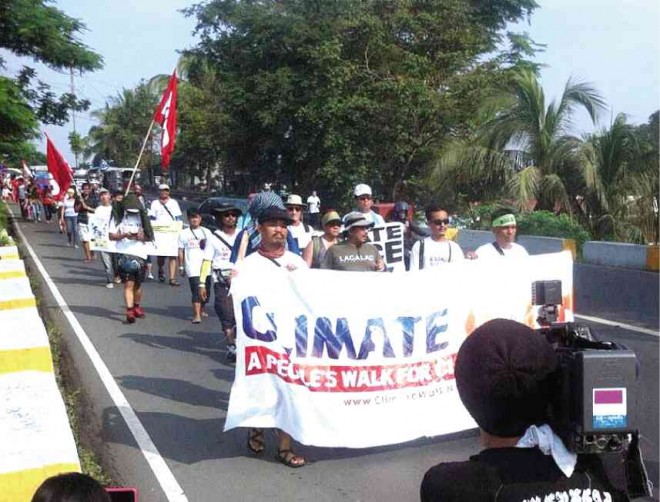
CLIMATE advocates embark on a 1,000-kilometer walk to raise public awareness on the effects of climate change and global warming. The group hopes to arrive in Tacloban City, Leyte province, the Ground Zero of Supertyphoon “Yolanda,” on Nov. 8. CONTRIBUTED PHOTO
NAGA CITY— Heaping hope and symbolism to raise public awareness about climate change and to demand action to ease its effects, a group of walkers reached this city on Saturday night, halfway to their destination, Tacloban City, from Manila—a distance of 1,000 kilometers.
They plan to reach the San Juanico Bridge on Nov. 8 to observe the first anniversary of
Supertyphoon “Yolanda,” the strongest typhoon to make landfall in human history, said Climate Change Commissioner Naderev “Yeb” Saño, the Philippines’ chief negotiator in the United Nations (UN) Climate Convention and leader of the core walkers.
Five days after Yolanda (international name: Haiyan) hit the Visayas and devastated the towns and cities in its path, with Tacloban as the worst-hit area, Saño made international headline on Nov. 13, 2013, when he cried before international representatives during the UN climate change summit in Warsaw, Poland.
“It’s time to stop this madness,” he told the UN Climate Change Convention’s 19th Conference of the Parties, as he appealed to industrialized countries to reduce carbon emission substantially to avert catastrophic climate events.
“We want to raise the urgent call globally, for industrialized countries to take climate change seriously. They consistently fail to take serious, ambitious action for this crisis,” Saño told the Inquirer.
The group arrived at Plaza Quezon here at past 6 p.m. from Libmanan town, more than 50 km north of this city, where they stayed the night on Friday. They held a simple program and presented a video about climate change and its effects.
Saño said the Manila-Tacloban walk had enabled them to understand the situation of ordinary Filipinos, with the aim of telling their stories about the effects of climate change and sharing these to others.
A representative from Barangay (village) Belen in Calabanga town, Camarines Sur province, narrated how Typhoon “Glenda,” which struck in July, left over 100 hectares of rice farms in her village covered in sand and families without livelihood.
“That is the story we want to tell our country and the whole world,” Saño said.
He said the 40-day walk was emblematic of the 40 days of rain in the story of deluge in Noah’s time. Like the number of Christ’s apostles, no less than 12 walkers comprised the core group, he said.
“We want to leave a mind-set in every town that they can do something, that they can enact policies and programs and empower people so that we can face climate change head-on. These are the things that can be done,” Saño said.
“The walk is for unity, a call to the whole nation, without political colors,” he emphasized. “If we can walk 1,000 km with only the barest minimum needs and survive, it means we can withstand the challenges of climate change and show resiliency.”
So far, the group had covered 440 km in 17 days, Saño said, noting that they were welcomed and supported in their every stop, and even depended on their personal funds and “the goodness of the people.”
The number would swell to hundreds in every phase of the walk, with supporters accompanying the group from town to town, he added.
For them to understand deeper what the people experience during disasters, the walkers would sleep in places typically used as evacuation centers, such as multipurpose halls or schools, Saño said.
In Naga City, they stayed at Jesse M. Robredo Coliseum on Saturday and Sunday before proceeding to their next destination on Monday morning. They were welcomed by about 200 supporters, including staff members of Rep. Leni Robredo and representatives of Jesse
- Robredo Movement, the Army’s 9th Infantry Division and the city government.
Even as he acknowledged the great difficulty of convincing industrialized countries to take substantial action against climate change, Saño called on them “to take urgent action in a legally binding way.”
“If world leaders do not respond, the people will take action. That is where we put our trust in our advocacy. I have no illusion that world leaders will change their minds but if the people express and strengthen their voices, I think we have a fighting chance,” he said.
“And I think world leaders will soon realize that the power is in the hands of people, not in the leaders who are merely there to serve the people.”